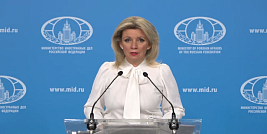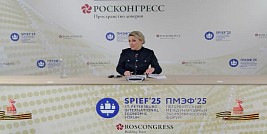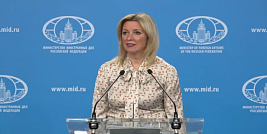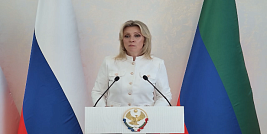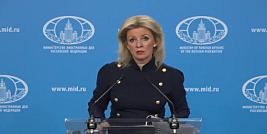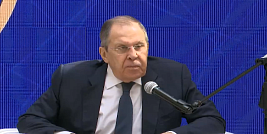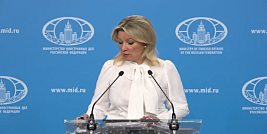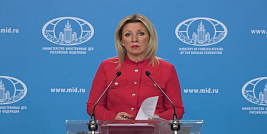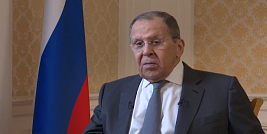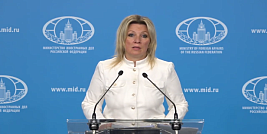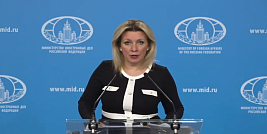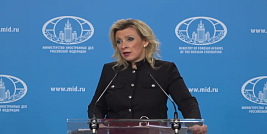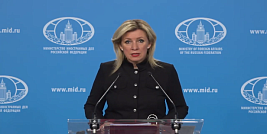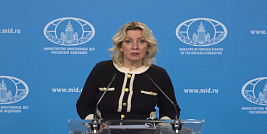Foreign Minister Sergey Lavrov’s remarks at the 11th Moscow Conference on International Security, Moscow, August 15, 2023
Ladies and gentlemen,
Friends,
I am honoured to be invited once again to address the Moscow Conference on International Security. It is also gratifying that participants from many states are attending despite persistent attempts by well-known Western circles to prevent their engagement with us.
Today, it is highly relevant to combine intellectual and practical efforts to improve the international situation and work out effective responses to the numerous threats and challenges. We are all witnessing large-scale and truly epoch-making shifts. A fairer and more stable world order, based on cultural and civilisational diversity and a balance of interests of the members of the international community, is fighting to emerge before our very eyes.
It is a long process with a variety of manifestations. Suffice it to mention the efforts by the global majority countries to assert their interests outside of Western mechanisms. The gradual de-dollarisation of the global economy and trade is also becoming a sign of the times – an increasing number of states are consistently reducing their dependence on the dollar and the euro, switching to national currencies and alternative payment systems in mutual transactions.
The very possibility of the dominance of one country or even a group of states is disappearing into oblivion. When EU High Representative for Foreign Affairs and Security Policy Josep Borrell tries to present Europe as a blooming “garden,” with nothing but a wild “jungle” around it that needs to be improved to become “civilised,” this only shows once again that this mentality, which allowed the West to rule the world for centuries, has led to a dead end. Today, it is of the essence to build a truly democratic multipolar world order based on generally recognised international legal norms, primarily the principles of the UN Charter, starting with the main one – respect for the sovereign equality of states, i.e. the natural and inalienable right of every nation to decide on its own future.
However, objective global trends seem to meet with an almost reflexive rejection on the part of the collective West led by Washington. In an effort to maintain the dominance they are about to lose, Western ruling elites are using a wide range of dirty tools, from forceful pressure and unilateral economic sanctions to demonising any dissidents in the global information landscape. The “cancel culture” runs rampant, suppressing anything that stands out or does not fit into the Western vision of history or modernity.
In violation of the UN Charter, the Americans and their NATO satellites are trying to tell other countries which allies to choose or avoid. This policy infringes on the right of those countries to pursue their national interests or an independent foreign policy. Westerners demonstrate blatant intolerance towards dissent, seeking to usurp the prerogative to shape the global agenda in all its aspects.
Western geopolitical engineers are directly provoking crises in various parts of the world. They are following the controlled chaos concept in order to fish in troubled waters. There is a lot of evidence of this. It is enough to mention the campaigns on the destruction of
Look how unanimously the West is reacting to the state coup in
Meanwhile, in February 2014, the overthrow of the legitimate president via a bloody coup, a day after the EU-guaranteed settlement agreement was reached, did not evoke any negative reaction in the West. I recall that a few days after the state coup, the then US Secretary of State John Kerry said that indeed there was a legitimate president but the people had withdrawn their support for him, so this was a “manifestation of democracy.” There are endless examples of hypocrisy and double standards like this.
To provide a political and ideological cover-up for their neocolonialist, racist line and enhance their own hegemony, the Western capitals are stubbornly trying to replace international law, which they violate every hour, with the “rules-based order.” President of Russia Vladimir Putin has repeatedly expressed his opinion on these actions. Thus, at a recent plenary session of the Second Russia-Africa Summit on July 28 of this year, he said: “Overall, it is not clear what these rules are and who formulated them. But it is clear that certain countries are using them for their own mercenary interests and adjusting them to the political situation.” I will add that they are trying to use these rules in their favour, as they see fit when this meets their interests in world trade, the global financial system, international security commitments and many other areas of interstate communication. There is also another obvious trend – the stubborn attempts of the Western minority to privatise secretariats of international organisations, including the UN, Breton-Woods institutions, the WTO and the OPCW. We are seeing a similar trend in the activities of international sports organisations.
Typically, Washington and its allies are not embarrassed by the fact that through their actions they are threatening global stability, creating new risks, and undermining supply chains, as well as food and energy security.
Building up their military presence near the Russian borders, the NATO members ignored for many years their promises to the Soviet leaders on the non-expansion of the alliance. They were crudely violating their commitments, assumed at the top level in the OSCE, to observe the principle of equal and indivisible security, not to enhance their own security at the expense of others and to prevent the domination of any party or organisation in
The
Another case in point is the Americans and NATO refusing to discuss in an honest manner President Vladimir Putin’s December 2021 initiatives on legally binding security guarantees. This “list” could be continued ad infinitum.
Today, the “collective West,” allegedly to “save” the neo-Nazi
Kiev and its Western sponsors are using all means at their disposal to bring other countries to support Zelensky's peace formula which, in fact, comes down to an ultimatum to bring Ukraine back to the borders as they were in 1991. I urge everyone who is being lured into this game to remember that the
We appreciate
In order to save their geopolitical project to “contain
Clearly, the attempt to shatter
Having declared the indivisible security of the Euro-Atlantic and the Indo-Pacific regions, NATO members have gone back on all their previous mantras about the purely defensive nature of the alliance and officially said that from now on they would not only defend their own territory, but also promote their dominance in the Asia-Pacific region.
The current policy seeks to destroy the inclusive and consensus-based ASEAN-centred security architecture in the Asia-Pacific region and to create military blocs and to build NATO infrastructure there. The West's position on
Other detrimental consequences of the
Along the lines of the notorious Monroe Doctrine, the
It is unlikely that the Western ruling circles will abandon their destructive policy in the foreseeable future. However, they will clearly not be able to reverse the course of history. The world has changed dramatically and needs alternative methods of ensuring global stability by creating security mechanisms that are beyond the control of
Relying on multilateral platforms that work on an equal footing and promote a constructive agenda can accelerate this process. We see good prospects in using the potentials of Eurasian associations, including the
In the global context, I would especially like to note the rapid growth of the prestige and attractiveness of BRICS, a framework where countries with different political systems and distinctive value platforms are setting an example of multipolar diplomacy aimed at agreeing on effective formats of trade, economic, investment and humanitarian interaction. These formats are implemented on equal terms and are protected from outside dictates.
Foreign policy coordination is also growing. One of the key items on the agenda of the forthcoming
Colleagues,
The geopolitical situation makes it difficult for us to pool efforts to neutralise the threats that are common to humanity, including fighting international terrorism, especially jihadist organisations like ISIS, Al-Qaeda and their offshoots that (we should keep in mind) have emerged in recent decades as a result of reckless military moves by the United States and its allies.
We must put an end to using terrorists for geopolitical purposes, be it in
Everyone should learn their lessons from the tragic consequences of the wars unleashed by the
We believe it is important that the UN, which has of late been fairly quiet in this regard, should act proactively and step up its efforts in fighting terrorism without relying on double standards.
Biological security has become particularly important, primarily in light of the facts of unchecked military biological activities by the
Preventing militarisation of outer space is a matter of special attention.
ICT challenges are mounting. As you may be aware,
Colleagues,
The Group of Friends in Defence of the Charter of the United Nations established two years ago at the initiative of
